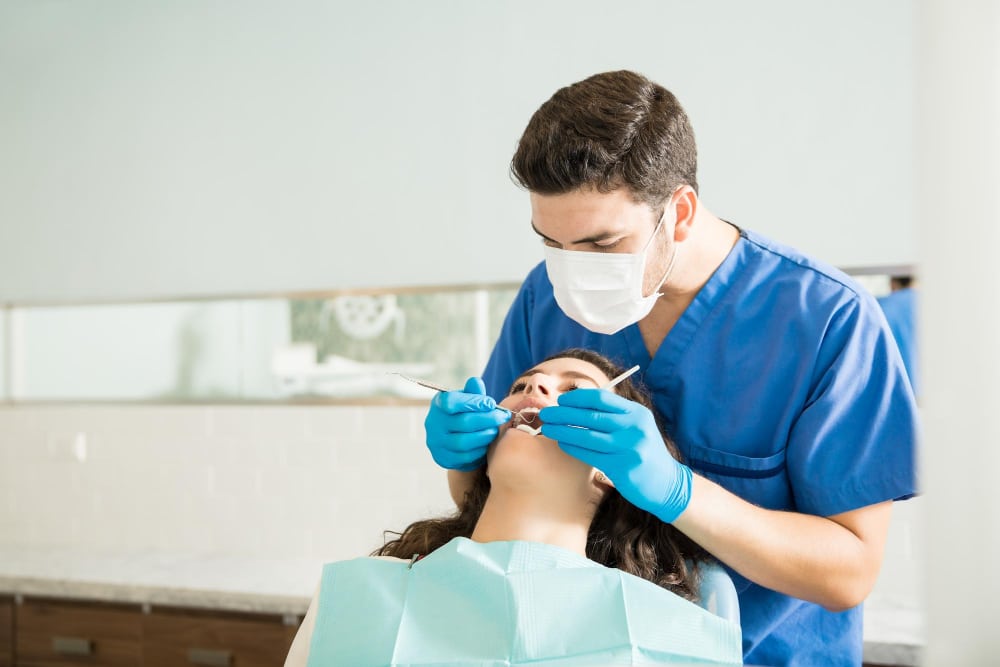
Welcome to our step-by-step guide on preventing tooth decay! We all know how important it is to maintain a healthy smile, but sometimes those pesky cavities can sneak up on us. Fear not, because this article will delve into tooth decay and equip you with the knowledge and tips to keep those pearly whites shining bright. From understanding what causes tooth decay to learning about preventive measures and which foods to avoid, we’ve got you covered. So let’s dive in and take control of your dental health!
What Is Tooth Decay?
Tooth decay, or dental caries or cavities, is a common oral health issue when the hard outer layer of your teeth, called enamel, begins to deteriorate. A combination of factors, including poor oral hygiene practices and certain bacteria in the mouth, causes it.
When we consume foods and drinks high in sugars and carbohydrates, these substances interact with the bacteria in our mouths to produce acids. Over time, these acids can erode the protective enamel coating on our teeth. Without proper care and attention, tooth decay can progress deeper into the tooth structure, leading to pain, infection, and even tooth loss.
The signs of tooth decay may vary depending on its severity. In the early stages, you might notice white spots or discoloration on your teeth, indicating demineralization. As it advances into the dentin (the layer beneath enamel), you may experience sensitivity or pain while eating or drinking hot/cold/sweet foods.
Regular dental check-ups are crucial for diagnosing tooth decay at its earliest stages before it becomes more problematic. By understanding what causes tooth decay and adopting preventive measures like brushing twice daily with fluoride toothpaste and flossing daily to remove plaque build-up between teeth roots and gumline areas – we can effectively combat this pesky problem! So stay tuned for more tips on preventing tooth decay in upcoming sections!
Causes Of Tooth Decay
Tooth decay, or dental caries, is a common oral health problem when acids produced by bacteria damage the tooth’s enamel. Several factors can contribute to the development of tooth decay.
Poor oral hygiene is one of the main causes of tooth decay. When we don’t brush and floss regularly, plaque builds up on our teeth. This sticky film contains bacteria that produce acid and feed on sugars in our food and drinks. Over time, this acid erodes the protective enamel layer, leading to cavities.
Another major cause of tooth decay is a diet high in sugary and acidic foods and beverages. Consuming too much sugar feeds the harmful bacteria in our mouths and increases their production of acids. Acidic foods and drinks such as citrus fruits, soda, and fruit juices can also weaken enamel.
A dry mouth or reduced saliva flow can also contribute to tooth decay because saliva helps neutralize acids in our mouths and wash away food particles.
Furthermore, certain medical conditions like acid reflux or eating disorders can increase the risk of tooth decay due to frequent exposure to stomach acids.
Inadequate fluoride intake also affects dental caries development since fluoride strengthens enamel and helps prevent cavities.
Understanding these causes can help prevent tooth decay through proper oral hygiene and healthier dietary choices. Regular brushing with fluoride toothpaste, flossing daily, limiting sugary snacks/drinks between meals, and regular dental check-ups will go a long way in maintaining optimal oral health!
How To Prevent Tooth Decay
Maintaining good oral hygiene is crucial in preventing tooth decay. You can protect your teeth and keep them healthy for years by following simple steps.
Make sure to brush your teeth at least twice daily with fluoride toothpaste. Brushing removes plaque and bacteria that can lead to cavities. Remember to use gentle circular motions and reach all surfaces of your teeth, including the back ones.
In addition to brushing, flossing is also essential for preventing tooth decay. Flossing helps remove food particles and plaque from areas your toothbrush cannot reach. Be thorough when flossing, and remember those hard-to-reach spaces between each tooth.
Another important step in preventing tooth decay is maintaining a balanced diet. Limit sugary snacks and drinks as they contribute to the formation of acids that erode enamel. Instead, opt for calcium-rich foods, such as dairy products or leafy greens, which help strengthen teeth.
Regular dental check-ups are vital in catching any potential issues early on. Dentists can identify signs of decay or other dental problems that may require treatment before they worsen.
By practicing these simple strategies consistently, you can minimize the risk of developing tooth decay and enjoy a bright smile for years to come!
Foods To Avoid For Tooth Decay
Foods play a crucial role in our overall health, including the health of our teeth. Avoiding certain foods is as important as practicing good oral hygiene when preventing tooth decay. Here are some key foods to avoid if you want to keep your pearly whites strong and healthy.
First on the list are sugary treats and beverages. This includes candies, cookies, cakes, sodas, and fruit juices with added sugars. These sugary delights can wreak havoc on your teeth by feeding the bacteria that cause tooth decay.
Next are acidic foods and drinks like citrus fruits, tomatoes, vinegar-based dressings or sauces, and carbonated drinks. Acidic foods can erode the enamel on your teeth over time, making them more susceptible to cavities.
Sticky snacks like caramel or dried fruit should also be avoided. They tend to cling to your teeth longer, providing an optimal environment for bacteria growth.
Last but certainly not least, limit your consumption of starchy foods like potato chips and white bread. These carbohydrates break down into sugars in your mouth, contributing to tooth decay.
By being mindful of these food choices and opting for healthier alternatives instead – such as fresh fruits and vegetables – you’ll be taking significant steps towards preventing tooth decay and maintaining excellent oral health!
The Bottom Line
Tooth decay is a common dental problem that can lead to pain, discomfort, and costly dental treatments. However, with proper care and preventive measures, you can significantly reduce the risk of tooth decay. Following the step-by-step guide in this article, you’ll be well-equipped to keep your teeth strong and healthy.
Remember that prevention is key when it comes to tooth decay. Start by understanding what causes it: poor oral hygiene, a diet high in sugary or acidic foods, dry mouth, and certain medical conditions. With this knowledge, you can take proactive steps to protect your teeth.
The first line of defense is maintaining good oral hygiene practices like brushing your teeth twice daily for at least two minutes each time and flossing daily. Additionally, consider using fluoride toothpaste or mouthwash, as they help strengthen enamel and prevent cavities.
Regular visits to the dentist are crucial for preventing tooth decay. Dentists can detect early signs of decay that may not be visible to the naked eye and provide professional cleaning treatments that remove plaque buildup from hard-to-reach areas.
Another important aspect of preventing tooth decay is being mindful of your diet. Avoid consuming highly sugary or acidic foods, contributing to enamel erosion and cavity formation. Instead, choose healthier alternatives like fruits and vegetables rich in vitamins A and C, promoting good oral health.



